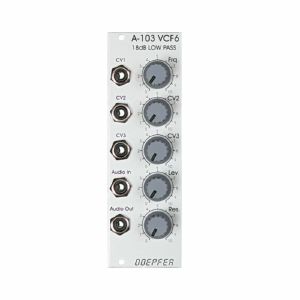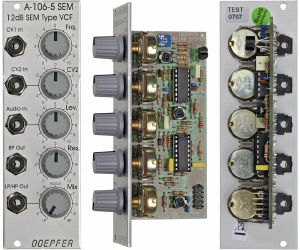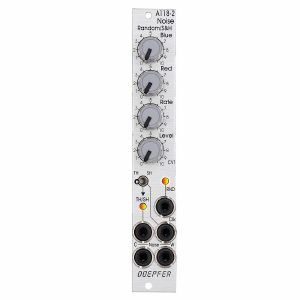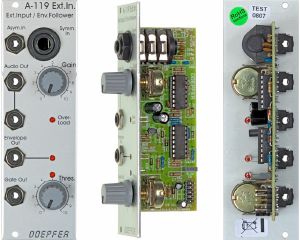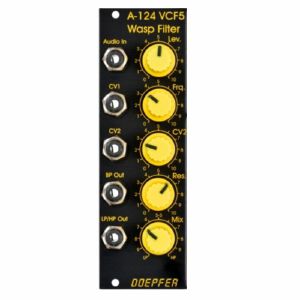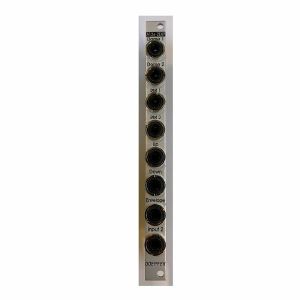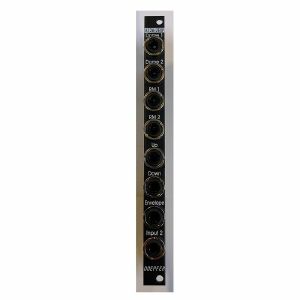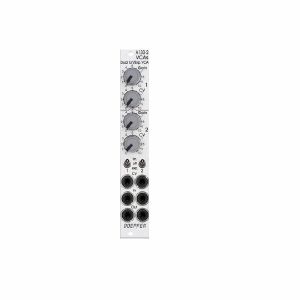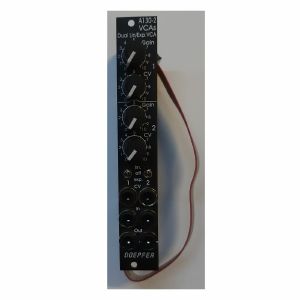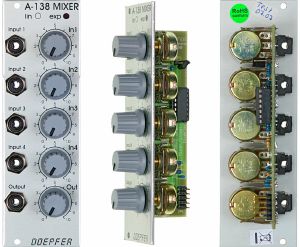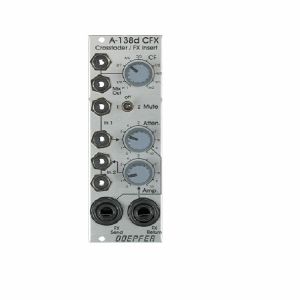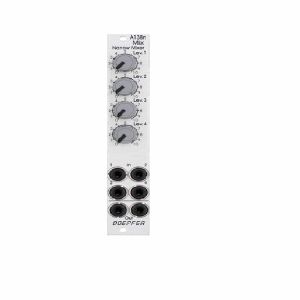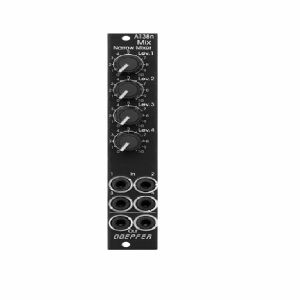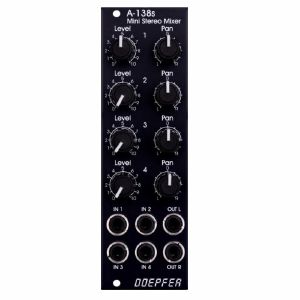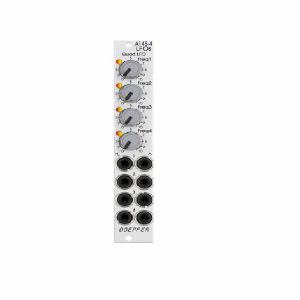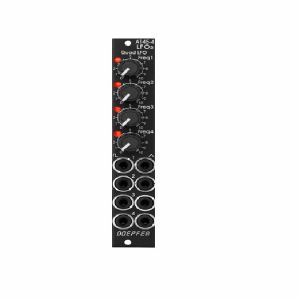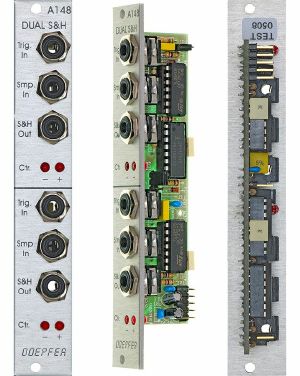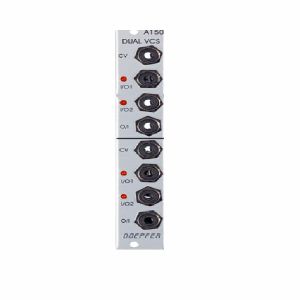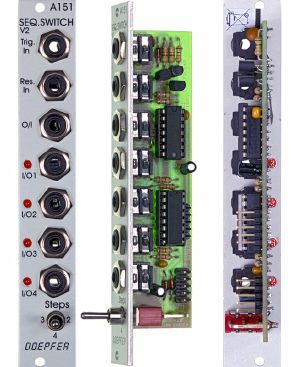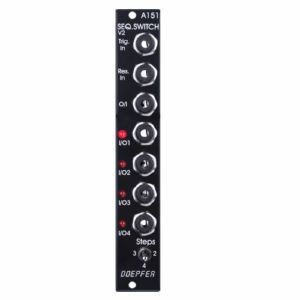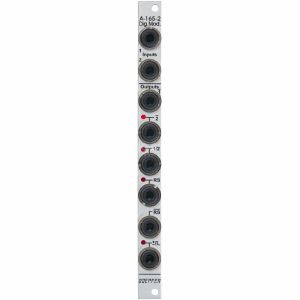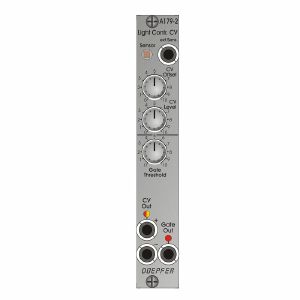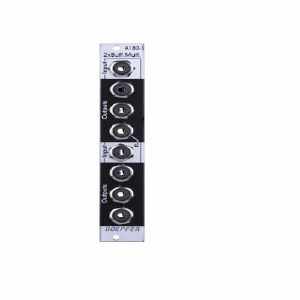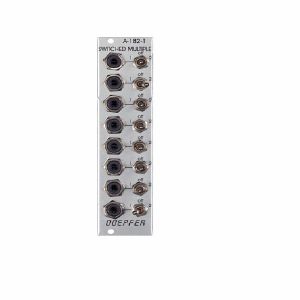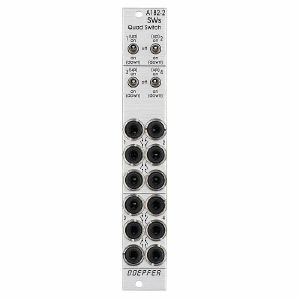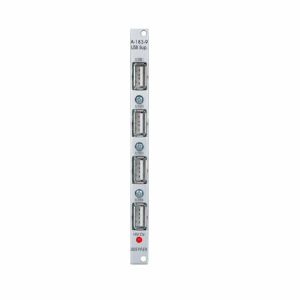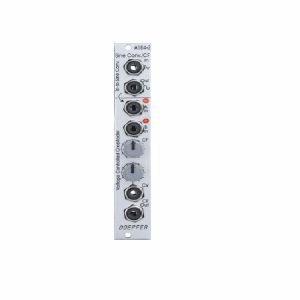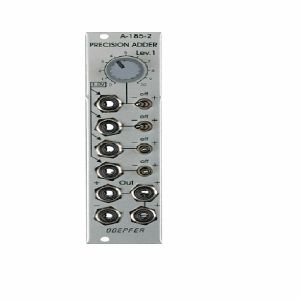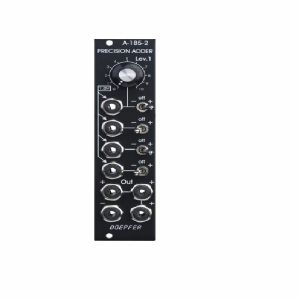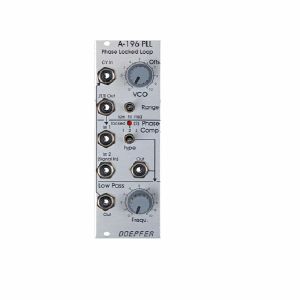Receive new release alerts for Doepfer
Items 1 to 30 of 30 on page 1 of 1
Doepfer A-103 VCF6 18dB Low Pass Filter Module (filter synth module)
Cat: 692504 Rel: 18 Jun 18
18dB low pass filter based on a modified Moog cascade - 8HP
Notes: Module A-103 is a voltage controlled low pass filter with 18dB/octave slope. The circuit is based on a modified transistor ladder (Moog ladder) and is a reproduction of the legendary TB303 filter.
As for the rest the A-103 is identical to the A-120 Moog low pass filter (same controls, inputs/outputs) only the filter sound is different.
… Read moreAs for the rest the A-103 is identical to the A-120 Moog low pass filter (same controls, inputs/outputs) only the filter sound is different.
1 in stock $96.05
Click for better price!
or call +44 20 7424 1960
quote 692504
quote 692504
Doepfer A-106-5 SEM 12dB SEM Type VCF Module (silver) (filter synth module)
Cat: 577753 Rel: 06 Jun 19
12dB multi-mode filter - 8HP
Notes: Module A-106-5 is a 12dB multimode filter that is based on the filter circuit of the Oberheim SEM module.
The filter is equipped with a band pass output and a combined low/notch/high pass output. For this output a control knob defines the relation between low and high pass signal. If both signals appear at the same level (i.e. middle position of the Mix knob) one obtains a notch filter. Otherwise the low or high pass signal predominates.
The module does not feature self-oscillation in contrast to most of the other filters of the A-100 system.
The module generates a distorted audio signal if the level control is set to about 50% (i.e. centre position) or more with A-100 standard signals like VCOs.
… Read moreThe filter is equipped with a band pass output and a combined low/notch/high pass output. For this output a control knob defines the relation between low and high pass signal. If both signals appear at the same level (i.e. middle position of the Mix knob) one obtains a notch filter. Otherwise the low or high pass signal predominates.
The module does not feature self-oscillation in contrast to most of the other filters of the A-100 system.
The module generates a distorted audio signal if the level control is set to about 50% (i.e. centre position) or more with A-100 standard signals like VCOs.
1 in stock $88.43
Doepfer A-118-2 Noise/Random/Sample & Hold Module (silver, slim line series) (noise/random/sample & hold synth module)
Cat: 731938 Rel: 10 Jun 19
Noise, random, sample & hold module - 4HP
Notes: Module A-118-2 is the slim version of module A-118-1 and offers essentially the same features as the A-118-1. But the distances between the controls are smaller and rubberized small-sized knobs are used. In return the front panel has 4 HP only which is half the width of the A-118-1. The module is primarily planned for applications where only limited space is available. The functional difference between A-118-1 and A-118-2 is the additional T&H/S&H unit which is not included in the A-118-1.
The module generates the signals white noise, colored noise, continuous random voltage and stepped random voltage (derived from the continuous random voltage by means of a S&H/T&H unit).
The noise signal is generated 100% analog by amplification of the noise of a transistor. White and colored noise are usually used as audio sources. The random voltages are normally used as control voltages (e.g. for filter frequency or any other voltage controlled parameter).
The A-118-2 gives you the ability to mix the relative amounts of Red (low frequency component) and Blue noise (high frequency component) in the colored noise output.
For the continuous random voltage the rate of change (Rate) and amplitude (Level) of the random voltage can be adjusted. The continuous random voltage is derived from the colored noise signal by low pass filtering. Consequently the settings of the controls for the colored noise (Blue, Red) affect the behavior of the random voltage! A dual color LED (red = positive / yellow = negative output voltage) indicates the continuous random voltage.
The continuous random voltage is used as source for the S&H/T&H unit. The type of operation can be set to S&H (sample and hold) or T&H (track and hold). When T&H is chosen the output signal follows the input signal (= continuous random voltage) as long as the Clock input is "high". As soon as the clock signal changes to "low" the last voltage is stored. When S&H is chosen the input signal (= continuous random voltage) is sampled at the rising edge of the Clock signal.
For the Clock signal a "digital" signal (e.g. Clock, Gate, rectangle output of an LFO) is required. It does not work with slowly changing continuous CV signals. Another dual color LED (red = positive / yellow = negative output voltage) indicates the stepped random voltage.
Controls:
Blue: share of the high frequencies in the the colored noise output
Red: share of the low frequencies in the the colored noise output
Rate: rate of change of the continuous random voltage
Level: amplitude of the continuous random voltage
TH/SH: switches between T&H and S&H
Inputs and outputs:
RND: continuous random voltage output (with LED display)
TH/SH: stepped random voltage output (with LED display)
Clk: Clock input of the S&H/T&H unit
C Noise: colored noise output
W Noise: white noise output
Important notes:
After power on it takes a few minutes until the two noise signals and the random signals are generated. The module is not faulty when after power on the signals do not appear immediately!
The S&H/T&H function is realized by pure analog circuitry (electronic switch followed by a holding capacitor and buffer). Consequently the output voltage drifts a bit in the holding state because the capacitor is discharged by parasitic resistors. The drift depends also upon environmental conditions like humidity or temperature.
Dimensions
4 HP
40 mm deep
Current Draw
20 mA +12V
20 mA -12V
… Read moreThe module generates the signals white noise, colored noise, continuous random voltage and stepped random voltage (derived from the continuous random voltage by means of a S&H/T&H unit).
The noise signal is generated 100% analog by amplification of the noise of a transistor. White and colored noise are usually used as audio sources. The random voltages are normally used as control voltages (e.g. for filter frequency or any other voltage controlled parameter).
The A-118-2 gives you the ability to mix the relative amounts of Red (low frequency component) and Blue noise (high frequency component) in the colored noise output.
For the continuous random voltage the rate of change (Rate) and amplitude (Level) of the random voltage can be adjusted. The continuous random voltage is derived from the colored noise signal by low pass filtering. Consequently the settings of the controls for the colored noise (Blue, Red) affect the behavior of the random voltage! A dual color LED (red = positive / yellow = negative output voltage) indicates the continuous random voltage.
The continuous random voltage is used as source for the S&H/T&H unit. The type of operation can be set to S&H (sample and hold) or T&H (track and hold). When T&H is chosen the output signal follows the input signal (= continuous random voltage) as long as the Clock input is "high". As soon as the clock signal changes to "low" the last voltage is stored. When S&H is chosen the input signal (= continuous random voltage) is sampled at the rising edge of the Clock signal.
For the Clock signal a "digital" signal (e.g. Clock, Gate, rectangle output of an LFO) is required. It does not work with slowly changing continuous CV signals. Another dual color LED (red = positive / yellow = negative output voltage) indicates the stepped random voltage.
Controls:
Blue: share of the high frequencies in the the colored noise output
Red: share of the low frequencies in the the colored noise output
Rate: rate of change of the continuous random voltage
Level: amplitude of the continuous random voltage
TH/SH: switches between T&H and S&H
Inputs and outputs:
RND: continuous random voltage output (with LED display)
TH/SH: stepped random voltage output (with LED display)
Clk: Clock input of the S&H/T&H unit
C Noise: colored noise output
W Noise: white noise output
Important notes:
After power on it takes a few minutes until the two noise signals and the random signals are generated. The module is not faulty when after power on the signals do not appear immediately!
The S&H/T&H function is realized by pure analog circuitry (electronic switch followed by a holding capacitor and buffer). Consequently the output voltage drifts a bit in the holding state because the capacitor is discharged by parasitic resistors. The drift depends also upon environmental conditions like humidity or temperature.
Dimensions
4 HP
40 mm deep
Current Draw
20 mA +12V
20 mA -12V
1 in stock $91.52
Doepfer A-119 External Input Envelope Follower Module (silver) (external/envelope follower/preamp/controller/comparator synth module)
Cat: 577771 Rel: 29 Nov 17
Envelope follower & pre-amplifier for microphone/line-signals - 8HP
Notes: Module A-119 (External Input / Envelope Follower) is designed to allow external audio signals to be integrated into the System A-100. It comprises a pre-amp, envelope follower, and comparator.
The pre-amp has two inputs: an unbalanced input for line level signals, with a gain factor of from 0 to 20, and a balanced input with a gain factor of from 0 to 500, for insertion of low level signals, for instance from a microphone or electric guitar.
The Envelope Follower reads the signal level of the input, and puts out a proportional voltage as an envelope at its own output.
The comparator generates a gate signal whenever the input goes above an adjustable trigger threshold.
Three LED's help you keep track of overload, the envelope, and the gate signal.
… Read moreThe pre-amp has two inputs: an unbalanced input for line level signals, with a gain factor of from 0 to 20, and a balanced input with a gain factor of from 0 to 500, for insertion of low level signals, for instance from a microphone or electric guitar.
The Envelope Follower reads the signal level of the input, and puts out a proportional voltage as an envelope at its own output.
The comparator generates a gate signal whenever the input goes above an adjustable trigger threshold.
Three LED's help you keep track of overload, the envelope, and the gate signal.
1 in stock $81.65
Click for better price!
or call +44 20 7424 1960
quote 577771
quote 577771
Doepfer A-124 VCF5 Wasp Filter 12dB Multimode Filter Module (special edition, black/yellow) (filter synth module)
Cat: 671564 Rel: 29 Nov 17
12dB multi-mode filter with unique classic circuitry, based on the filter from the 70s EDP Wasp synth
Notes: Module A-124 is a special 12dB multimode filter using the "strange" filter circuit of the "EDP Wasp" (an analog synthesizer with black/yellow case built end of the seventies, manufactured by the UK company "Electronic Dream Plant" with Chris Huggett und Adrian Wagner). This design "abuses" digital inverters as analog operational amplifiers leading to distortions and other "dirty" effects that generate the specific sound of this filter. The filter is equipped with a band pass output and a combined low/notch/high pass output. For this output a control knob defines the relation between low and high pass signal. If both signals appear at the same level (i.e. middle position of the Mix knob) one obtains a notch filter. Otherwise the low or high pass signal predominates. The module does not feature self-oscillation in contrast to most of the other filters of the A-100 system.
Inputs: Audio In, CV In (2x)
Outputs: Bandpass Out, Low/Highpass Mix-Out
Controls: Audio and CV attenuator, Frequency, Resonance, LP/HP Mix
The function and operation of this module is very similar to the module SEM VCF A-106-5. But the sound of both filters is very different! The only functional difference is the position of the sockets and controls, and the function of the controls CV2 (A-124: normal attenuator, A-106-5: polarizer).
- 3U Eurorack module, 8HP wide, 45mm deep
- Current draw 30mA
… Read moreInputs: Audio In, CV In (2x)
Outputs: Bandpass Out, Low/Highpass Mix-Out
Controls: Audio and CV attenuator, Frequency, Resonance, LP/HP Mix
The function and operation of this module is very similar to the module SEM VCF A-106-5. But the sound of both filters is very different! The only functional difference is the position of the sockets and controls, and the function of the controls CV2 (A-124: normal attenuator, A-106-5: polarizer).
- 3U Eurorack module, 8HP wide, 45mm deep
- Current draw 30mA
1 in stock $94.91
Click for better price!
or call +44 20 7424 1960
quote 671564
quote 671564
Doepfer A-126-2exp Voltage Controlled Frequency Shifter II - Expansion Module (silver) (expander synth module)
Cat: 852803 Rel: 04 Feb 22
An expander for the A-126-2 Voltage Controlled Frequency Shifter.
Notes: The Doepfer A-126-2exp is an expander for the A-126-2 Voltage Controlled Frequency Shifter.
It adds two outputs from the Dome filter (+45 and -45 degrees) as well as separate outputs from the ring modulators 1 and 2, and from the internal envelope generator. Furthermore, it offers dedicated outputs for Up and Down Shift, allowing the module to be patched in stereo.
*Note: The expander can only be used in conjunction with the module A-126-2.
HP : 2
… Read moreIt adds two outputs from the Dome filter (+45 and -45 degrees) as well as separate outputs from the ring modulators 1 and 2, and from the internal envelope generator. Furthermore, it offers dedicated outputs for Up and Down Shift, allowing the module to be patched in stereo.
*Note: The expander can only be used in conjunction with the module A-126-2.
HP : 2
1 in stock $53.96
Click for better price!
or call +44 20 7424 1960
quote 852803
quote 852803
Doepfer A-126-2exp Voltage Controlled Frequency Shifter II - Expansion Vintage Edition Module (black) (expander synth module)
Cat: 852807 Rel: 04 Feb 22
An expander for the A-126-2 Voltage Controlled Frequency Shifter.
Notes: The Doepfer A-126-2exp is an expander for the A-126-2 Voltage Controlled Frequency Shifter.
It adds two outputs from the Dome filter (+45 and -45 degrees) as well as separate outputs from the ring modulators 1 and 2, and from the internal envelope generator. Furthermore, it offers dedicated outputs for Up and Down Shift, allowing the module to be patched in stereo.
*Note: The expander can only be used in conjunction with the module A-126-2.
HP : 2
… Read moreIt adds two outputs from the Dome filter (+45 and -45 degrees) as well as separate outputs from the ring modulators 1 and 2, and from the internal envelope generator. Furthermore, it offers dedicated outputs for Up and Down Shift, allowing the module to be patched in stereo.
*Note: The expander can only be used in conjunction with the module A-126-2.
HP : 2
1 in stock $56.50
Click for better price!
or call +44 20 7424 1960
quote 852807
quote 852807
Doepfer A-130-2 Dual Linear/Exponential VCA Slim Line Series Module (dual/stereo/VCA synth module)
Cat: 731940 Rel: 11 Jun 19
Compact two-channel VCA - 4HP
Notes: Module A-130-2 is the slim version of module A-132-3 and offers essentially the same features. But the distances between the controls are smaller and rubberized small-sized knobs are used. In return the front panel has 4 HP only which is half the width of the A-132-3. The module is primarily planned for applications where only limited space is available.
The module is composed of two identical voltage controlled amplifiers (VCA). Each VCA has a manual gain control (also named Initial Gain) and a control voltage input with attenuator. The character of the control scale can be switched to linear or exponential. All inputs and outputs are DC coupled. Consequently the VCAs can be used to process both audio and control voltages (e.g. for voltage control of the level of LFO or envelope signals). The signal input has no attenuator available but is capable to process up to 16Vpp signals (i.e. -8V...+8V) without distortion. For the processing of higher levels an external attenuator (e.g. A-183-1) is recommended.
The amplification range is 0...1. Even with a higher external control voltage the amplification remains at 1 (kind of "amplification clipping" at 1).
Controls (for each of both units):
- Gain: manual gain control (Initial Gain) in the range 0...1
- CV: attenuator for the CV input
- Lin/Exp: switches the VCA characteristic to linear or exponential, in center position the VCA is off (mute function)
Inputs and outputs (for each of both units):
- CV: control voltage input, min. +5V required for max. amplification (1) with CV control fully CW and Gain fully CCW
- In: signal input, max. 16Vpp (+8V...-8V) without distortion
- Out: signal output
… Read moreThe module is composed of two identical voltage controlled amplifiers (VCA). Each VCA has a manual gain control (also named Initial Gain) and a control voltage input with attenuator. The character of the control scale can be switched to linear or exponential. All inputs and outputs are DC coupled. Consequently the VCAs can be used to process both audio and control voltages (e.g. for voltage control of the level of LFO or envelope signals). The signal input has no attenuator available but is capable to process up to 16Vpp signals (i.e. -8V...+8V) without distortion. For the processing of higher levels an external attenuator (e.g. A-183-1) is recommended.
The amplification range is 0...1. Even with a higher external control voltage the amplification remains at 1 (kind of "amplification clipping" at 1).
Controls (for each of both units):
- Gain: manual gain control (Initial Gain) in the range 0...1
- CV: attenuator for the CV input
- Lin/Exp: switches the VCA characteristic to linear or exponential, in center position the VCA is off (mute function)
Inputs and outputs (for each of both units):
- CV: control voltage input, min. +5V required for max. amplification (1) with CV control fully CW and Gain fully CCW
- In: signal input, max. 16Vpp (+8V...-8V) without distortion
- Out: signal output
6 in stock $90.97
Click for better price!
or call +44 20 7424 1960
quote 731940
quote 731940
Doepfer A-130-2v VCAs Dual Linear/Exponential VCA Module (vintage edition, slim line series) (amplifier module)
Cat: 973749 Rel: 14 Nov 23
Dual linear/exponential VCA module - 4HP.
Notes: Module A-130-2v is composed of two identical voltage controlled amplifiers (VCA). Each VCA has a manual gain control (also named Initial Gain) and a control voltage input with attenuator. The character of the control scale can be switched to linear or exponential. All inputs and outputs are DC coupled. Consequently the VCAs can be used to process both audio and control voltages (e.g. for voltage control of the level of LFO or envelope signals). The signal input has no attenuator available but is capable to process up to 16Vpp signals (i.e. -8V...+8V) without distortion. For the processing of higher levels an external attenuator (e.g. A-183-1) is recommended.
The amplification range is 0...1. Even with a higher external control voltage the amplification remains at 1 (kind of "amplification clipping" at 1).
Controls (for each of both units):
Gain: manual gain control (Initial Gain) in the range 0...1
CV: attenuator for the CV input
lin/exp: switches the VCA characteristic to linear or exponential, in center position the VCA is off (mute function)
Inputs and outputs (for each of both units):
CV: control voltage input, min. +5V required for max. amplification (1) with CV control fully CW and Gain fully CCW
In: signal input, max. 16Vpp (+8V...-8V) without distortion
Out: signal output
A-130-2v is the slim version of module A-132-3 and offers essentially the same features. But the distances between the controls are smaller and rubberized small-sized knobs are used. In return the front panel has 4 HP only which is half the width of the A-132-3. The module is primarily planned for applications where only limited space is available.
Power consumption: 30mA at +12V and 30mA at -12V
Depth: 50mm
HP : 4
… Read moreThe amplification range is 0...1. Even with a higher external control voltage the amplification remains at 1 (kind of "amplification clipping" at 1).
Controls (for each of both units):
Gain: manual gain control (Initial Gain) in the range 0...1
CV: attenuator for the CV input
lin/exp: switches the VCA characteristic to linear or exponential, in center position the VCA is off (mute function)
Inputs and outputs (for each of both units):
CV: control voltage input, min. +5V required for max. amplification (1) with CV control fully CW and Gain fully CCW
In: signal input, max. 16Vpp (+8V...-8V) without distortion
Out: signal output
A-130-2v is the slim version of module A-132-3 and offers essentially the same features. But the distances between the controls are smaller and rubberized small-sized knobs are used. In return the front panel has 4 HP only which is half the width of the A-132-3. The module is primarily planned for applications where only limited space is available.
Power consumption: 30mA at +12V and 30mA at -12V
Depth: 50mm
HP : 4
1 in stock $99.44
Click for better price!
or call +44 20 7424 1960
quote 973749
quote 973749
Doepfer A-138b 4-Channel Mixer Logarithmic Module (silver) (mixer synth module)
Cat: 577776 Rel: 29 Nov 17
Four channel mixer module - 8HP
Notes: Module A-138 is a four channel mixer, which can be used with either control voltages or audio signals. Each of the four inputs has an attenuator, and there's a master attenuator, so that the mixer can be used at the end of the audio chain, i.e. it can be used to interface directly with an external mixer, amplifier, etc.
The A-138b has potentiometers with logarithmic response, so is especially suitable for audio signal mixing.
… Read moreThe A-138b has potentiometers with logarithmic response, so is especially suitable for audio signal mixing.
1 in stock $67.52
Click for better price!
or call +44 20 7424 1960
quote 577776
quote 577776
Doepfer A-138d Crossfader/FX Insert Module (external/mixer synth module)
Cat: 716947 Rel: 29 Jan 19
Crossfader for two different A-100 signals, plus insert for external effects
Notes: The A-138d primarily is used for crossfading between two modular signals. On the other hand you can used it for inserting stompboxes or other effects into your modular system. Both the inputs and the mix output are available twice, like a mini-multiples e.g. for using the input signal also for other applications, kind of like a Thru.
Crossfader: With the crossfading control CF you blend manually between the inputs In 1 and In 2. The Mute switch allows for muting one of the two signals, independent on the crossfader position.
Effect insert: The signal at input In1 is emitted at the FX Send output and can be attenuated with the Atten. control because the modular system works with much higher levels.
The effect unit's output is inserted to the FX Return input socket and its level can be boosted with the Amp. control. The processed signal is available at the bottom in 2 socket.
Use the CF control to blend between the original signal and the effect signal and to mute switch for quick muting e.g. of the effect return signal.
… Read moreCrossfader: With the crossfading control CF you blend manually between the inputs In 1 and In 2. The Mute switch allows for muting one of the two signals, independent on the crossfader position.
Effect insert: The signal at input In1 is emitted at the FX Send output and can be attenuated with the Atten. control because the modular system works with much higher levels.
The effect unit's output is inserted to the FX Return input socket and its level can be boosted with the Amp. control. The processed signal is available at the bottom in 2 socket.
Use the CF control to blend between the original signal and the effect signal and to mute switch for quick muting e.g. of the effect return signal.
1 in stock $75.05
Doepfer A-138n Narrow Mixer Module (silver, slim line series) (mixer synth module)
Cat: 731947 Rel: 10 Jun 19
4-channel mixer module - 4HP
Notes: Module A-138n is a simple four channel mixer, which can be used with either control voltages or audio signals. Each of the four inputs has an attenuator available. The output is twice available (two sockets, hard-wired like a multiple).
The module is the slim version of module A-138a and offers nearly the same features. But the distances between the controls are smaller and rubberized small-sized knobs are used. In return the front panel has 4 HP only which is half the width of the A-138a. The module is primarily planned for applications where only limited space is available. The only functional difference compared to the A-138a is the missing attenuator for the (dual) output.
Width: 4HP / 20.0 mm
Depth: 30 mm (measured from the rear side of the front panel)
Current: +10mA (+12V) / -10mA (-12V)
… Read moreThe module is the slim version of module A-138a and offers nearly the same features. But the distances between the controls are smaller and rubberized small-sized knobs are used. In return the front panel has 4 HP only which is half the width of the A-138a. The module is primarily planned for applications where only limited space is available. The only functional difference compared to the A-138a is the missing attenuator for the (dual) output.
Width: 4HP / 20.0 mm
Depth: 30 mm (measured from the rear side of the front panel)
Current: +10mA (+12V) / -10mA (-12V)
2 in stock $58.19
Doepfer A-138nv Narrow Mini Mixer Vintage Edition Module (black) (mixer/quad synth module)
Cat: 760211 Rel: 06 Mar 20
Narrow mini mixer module - 4HP.
Notes: Compact and simple four-input mixer module from Uncle Dieter. Linear pots make it suited to mixing CV signals but it can also handle audio. Mixed signal hard-wired to two sockets.
Supplier notes:
Module A-138n is a simple four channel mixer, which can be used with either control voltages or audio signals. Each of the four inputs has an attenuator available. The output is twice available (two sockets, hard-wired like a multiple).
HP : 4
… Read moreSupplier notes:
Module A-138n is a simple four channel mixer, which can be used with either control voltages or audio signals. Each of the four inputs has an attenuator available. The output is twice available (two sockets, hard-wired like a multiple).
HP : 4
1 in stock $75.71
Click for better price!
or call +44 20 7424 1960
quote 760211
quote 760211
Doepfer A-138sv Mini Stereo Mixer Vintage Edition Module (black) (mixer synth module)
Cat: 684443 Rel: 30 Apr 18
Four-channel stereo mixer - 8HP
Notes: A-138s is a simple but useful 4-in-2 mixing tool. It has four inputs available. Each input is equipped with an attenuator (Level) and a panning control that is used to distribute the signal to the left and right output. Beyond stereo mixing it is equally suited to create variable parallel routings. For example: Any of the four inputs may be routed in variable intensity to feed two filters.
You may regard the A-138s as a smaller version of the A-138m Matrix Mixer.
Inputs and outputs are DC coupled, i.e. the module can be used for the mixing of control signals too.
- 3U Eurorack module, 8 HP wide, 30 mm in depth
- Power consumption: 10 mA at +12 V and 10 mA at -12 V
… Read moreYou may regard the A-138s as a smaller version of the A-138m Matrix Mixer.
Inputs and outputs are DC coupled, i.e. the module can be used for the mixing of control signals too.
- 3U Eurorack module, 8 HP wide, 30 mm in depth
- Power consumption: 10 mA at +12 V and 10 mA at -12 V
1 in stock $91.52
Doepfer A-145-4 LFOs Quad Low Frequency Oscillator Slim Line Module (silver) (LFO synth module)
Cat: 731949 Rel: 10 Jun 19
Quad low frequency oscillator - 4HP
Notes: Module A-145-4 is a simple quad LFO (Low Frequency Oscillator). Not a very "exciting" module, just a bread-and-butter device and a simple demon for work. Virtually in every modular system several LFOs are required for modulation purposes. The module contains four simple LFOs with the waveforms triangle and rectangle. A dual colour LED (red = positive / yellow = negative output voltage) indicates the triangle output of each LFO. The frequency range can be chosen for each LFO individually by means of a jumper between about 50 Hz ... 0.04 Hz (about 20 seconds, jumper removed) and about 2Hz ... 0.002 (about 8 minutes, jumper installed).
The module can be treated as a slimmed version of the quad LFO A-143-3 as it has similar features available. But the distances between the controls are smaller and rubberized small-sized knobs are used. In return the front panel has 4 HP only which is less than one third of the A-143-3. The module is primarily planned for applications where only limited space is available. The functional difference compared to the A-143-3 are the missing sawtooth outputs and frequency range switches.
… Read moreThe module can be treated as a slimmed version of the quad LFO A-143-3 as it has similar features available. But the distances between the controls are smaller and rubberized small-sized knobs are used. In return the front panel has 4 HP only which is less than one third of the A-143-3. The module is primarily planned for applications where only limited space is available. The functional difference compared to the A-143-3 are the missing sawtooth outputs and frequency range switches.
2 in stock $77.69
Doepfer A-145-4v Quad LFO Module (vintage edition) (LFO synth module)
Cat: 760210 Rel: 01 Apr 20
Quad low frequency oscillator module
Notes: Module A-145-4 is a simple quad LFO (Low Frequency Oscillator). Not a very "exciting" module, just a bread-and-butter device and a simple demon for work. Virtually in every modular system several LFOs are required for modulation purposes. The module contains four simple LFOs with the waveforms triangle and rectangle. A dual colour LED (red = positive / yellow = negative output voltage) indicates the triangle output of each LFO. The frequency range can be chosen for each LFO individually by means of a jumper between about 50 Hz ... 0.04 Hz (about 20 seconds, jumper removed) and about 2Hz ... 0.002 (about 8 minutes, jumper installed).
The module can be treated as a slimmed version of the quad LFO A-143-3 as it has similar features available. But the distances between the controls are smaller and rubberized small-sized knobs are used. In return the front panel has 4 HP only which is less than one third of the A-143-3. The module is primarily planned for applications where only limited space is available. The functional difference compared to the A-143-3 are the missing sawtooth outputs and frequency range switches.
… Read moreThe module can be treated as a slimmed version of the quad LFO A-143-3 as it has similar features available. But the distances between the controls are smaller and rubberized small-sized knobs are used. In return the front panel has 4 HP only which is less than one third of the A-143-3. The module is primarily planned for applications where only limited space is available. The functional difference compared to the A-143-3 are the missing sawtooth outputs and frequency range switches.
1 in stock $97.18
Click for better price!
or call +44 20 7424 1960
quote 760210
quote 760210
Doepfer A-148 Dual Sample & Hold - Track & Hold Module (silver) (CV modulation/sample & hold/dual/stereo synth module)
Cat: 577745 Rel: 29 Nov 17
Two sample & hold units in one module for generating stepped random voltages or slicing signals
Notes: Module A-148 (Dual S&H) has two identical sample & hold modules, designed to produce 'staircase' voltages. The signal present at the sample input is sampled at a rate set by the signal at the trigger input, and held at that voltage at the S&H output.
The exact shape of the staircase depends on the sort of waveform at the sample input: NOISE or RANDOM signals produce random patterns; an LFO produces rising or falling staircase patterns.
Two LEDs for each S&H indicate the voltage (positive or negative) of the sampled signal.
… Read moreThe exact shape of the staircase depends on the sort of waveform at the sample input: NOISE or RANDOM signals produce random patterns; an LFO produces rising or falling staircase patterns.
Two LEDs for each S&H indicate the voltage (positive or negative) of the sampled signal.
1 in stock $72.32
Click for better price!
or call +44 20 7424 1960
quote 577745
quote 577745
Doepfer A-150 Dual Voltage Controlled Switch Module (silver) (switch synth module)
Cat: 745778 Rel: 10 Sep 19
Two independent voltage controlled switches in one module - 4HP
Notes: Module A-150-1 (Dual VCS) contains two separate voltage-controlled switches.
Each switch has a control voltage input, a common Out / Input, and two In / Outputs. The switches are bi-directional: they can work in both directions, so can connect one input to either of two outputs, or either of two inputs to one output. Voltages in the range -8V...+8V at the O/I resp. I/O sockets can be processed by the module.
Two LEDs show which in / output is active (i.e. which is connected to the common out / input).
… Read moreEach switch has a control voltage input, a common Out / Input, and two In / Outputs. The switches are bi-directional: they can work in both directions, so can connect one input to either of two outputs, or either of two inputs to one output. Voltages in the range -8V...+8V at the O/I resp. I/O sockets can be processed by the module.
Two LEDs show which in / output is active (i.e. which is connected to the common out / input).
1 in stock $72.32
Click for better price!
or call +44 20 7424 1960
quote 745778
quote 745778
Doepfer A-151 Sequential Switch v2 Module (silver) (switch synth module)
Cat: 577792 Rel: 06 Jun 19
Quad sequential switch module - 4HP
Notes: Module A-151 (Quad Sequential Switch) is like an electronic four-position rotary switch.
It includes trigger and reset inputs, four in / outputs, and a common out / input. Each time a pulse is received at the trigger input socket, the common out / input is connected to the next in / output. After the fourth in / output, the next trigger makes it step back to the first again, and so on. A positive pulse at the reset input switches the out / input immediately back to the first in / output.
Voltages in the range -12V...+12V at the O/I resp. I/O sockets can be processed by the module (not only control voltages but also gate, trigger or clock signals provided that they are in the -12V...+12V range).
By means of a toggle switch the number of steps can be limited to 2, 3 or 4.
Four LEDs indicate the active in / output (ie. the on that is connected to the out / input at any particular time).
For more detailed information please look at the English user's manual: A151_man.pdf.
Similar modules:
A-150-1 Dual Voltage Controlled Switch
A-150-8 Octal Manual/Voltage Controlled Programmable Switches
A-152 Voltage Addressed Track&Hold / Switch (Multiplexer) / Digital Outputs
Technical notes:
To protect the electronic switches in case of an unsuitable patch (e.g. connection of two outputs) a 1k protection resistor is inserted into the O/I line. If control voltages used for VCOs are switched this may cause a small voltage drop and lead to undesired audible detuning. For this application we recommend to insert a CV buffer between A-151 and the VCO(s), e.g. the modules A-180-3, A-180-4 or the Precision Adder A-185-2. Integrating the buffer into the module A-151 is not possible because this would ruin the bidirectionality of the switches.
For modules manufactured before spring 2005 the voltage range at the in/outputs was limited to -8V...+8V. From spring 2005 the revised version of the module was available. With an additional switch the number of steps can be set to 2, 3 or 4 (thanks to Peter Grenader for this idea). Moreover the revised module allows to process voltages in the full A-100 voltage range (i.e. -12V...+12V). The limitation to -8V...+8V is no longer valid. The A-100 DIY page describes how to install this additional switch for the old version of A-151.
Width: 4 HP / 20.0 mm
Depth: 35 mm (measured from the rear side of the front panel)
Current: +20mA (+12V) / -10mA (-12V)
… Read moreIt includes trigger and reset inputs, four in / outputs, and a common out / input. Each time a pulse is received at the trigger input socket, the common out / input is connected to the next in / output. After the fourth in / output, the next trigger makes it step back to the first again, and so on. A positive pulse at the reset input switches the out / input immediately back to the first in / output.
Voltages in the range -12V...+12V at the O/I resp. I/O sockets can be processed by the module (not only control voltages but also gate, trigger or clock signals provided that they are in the -12V...+12V range).
By means of a toggle switch the number of steps can be limited to 2, 3 or 4.
Four LEDs indicate the active in / output (ie. the on that is connected to the out / input at any particular time).
For more detailed information please look at the English user's manual: A151_man.pdf.
Similar modules:
A-150-1 Dual Voltage Controlled Switch
A-150-8 Octal Manual/Voltage Controlled Programmable Switches
A-152 Voltage Addressed Track&Hold / Switch (Multiplexer) / Digital Outputs
Technical notes:
To protect the electronic switches in case of an unsuitable patch (e.g. connection of two outputs) a 1k protection resistor is inserted into the O/I line. If control voltages used for VCOs are switched this may cause a small voltage drop and lead to undesired audible detuning. For this application we recommend to insert a CV buffer between A-151 and the VCO(s), e.g. the modules A-180-3, A-180-4 or the Precision Adder A-185-2. Integrating the buffer into the module A-151 is not possible because this would ruin the bidirectionality of the switches.
For modules manufactured before spring 2005 the voltage range at the in/outputs was limited to -8V...+8V. From spring 2005 the revised version of the module was available. With an additional switch the number of steps can be set to 2, 3 or 4 (thanks to Peter Grenader for this idea). Moreover the revised module allows to process voltages in the full A-100 voltage range (i.e. -12V...+12V). The limitation to -8V...+8V is no longer valid. The A-100 DIY page describes how to install this additional switch for the old version of A-151.
Width: 4 HP / 20.0 mm
Depth: 35 mm (measured from the rear side of the front panel)
Current: +20mA (+12V) / -10mA (-12V)
1 in stock $63.28
Doepfer A-151v Quad Sequential Switch Vintage Edition Module (black) (CV processor synth module)
Cat: 684462 Rel: 22 May 18
Electronic switch with up to four steps - 4HP
Notes: Module A-151 (Quad Sequential Switch) is like an electronic four-position rotary switch.
It includes trigger and reset inputs, four in/outputs, and a common out/input. Each time a pulse is received at the trigger input socket, the common out/input is connected to the next in/output. After the fourth in/output, the next trigger makes it step back to the first again, and so on. A positive pulse at the reset input switches the out/input immediately back to the first in/output. Voltages in the range -8V...+8V at the O/I resp. I/O sockets can be processed by the module.
Four LED's indicate the active in/output (ie. the one that is connected to the out/input at any particular time).
… Read moreIt includes trigger and reset inputs, four in/outputs, and a common out/input. Each time a pulse is received at the trigger input socket, the common out/input is connected to the next in/output. After the fourth in/output, the next trigger makes it step back to the first again, and so on. A positive pulse at the reset input switches the out/input immediately back to the first in/output. Voltages in the range -8V...+8V at the O/I resp. I/O sockets can be processed by the module.
Four LED's indicate the active in/output (ie. the one that is connected to the out/input at any particular time).
1 in stock $67.79
Doepfer A-165-2 Digital Modifiers Module (slim line) (modular synthesiser)
Cat: 1021149 Rel: 05 Jul 24
Digital modifiers module - 2HP
Notes: Module A-165-2 includes six modification circuits for digital signals (clock, gate, trigger, start, stop etc.) which are derived from the two input signals Input 1 und 2:
inverted signal of Input 1 (labelled 1)
inverted signal of Input 2 (labelled 2)
T flipflop (toggle flipflop), controlled by Input 1, this output changes it's state whenever a the rising edge of Input 1 appears (labelled 1/2, as it works similar to a 1:2 frequency divider)
Set/Reset flipflop, this output changes it's state to "high" during the rising edge of Input 1 and turns "low" during the rising edge of Input 2 (labelled RS)
inverted output of the Set/Reset flipflop (labelled RS)
pulse output, during both the rising and falling edge of Input 1 a short trigger pulse with about 50 ms lenght is generated (labelled with the sign ± and a rectangle pulse symbol)
The outputs 2, 1/2, RS and the pulse output are equipped with LEDs that display the state of the output in question.
The output level for all six outputs can be set to 0/+5V or 0/+11V by means of a jumper on the pc board.
Voltage thresholds for the input voltages:
voltages below +0,8 V are treated as "low"
voltages above +3 V are treated as "high"
Typical applications
starting and/or stopping of events or switching operations with the RS or RS output (e.g. controlled by the trigger outputs of a sequencer, e.g. in combination with electronic switches)
generation of inverted digital signals
frequency division (1/2 output)
generation of short pulses during the rising and falling edge of a digital signal (e.g. triggering an envelope at both rising and falling edge of a gate signal).
Technical notes
The module cannot be used for bipolar signals! The negative share of the input signal will be clipped by means of a so-called clipping diode at the input of module A-165-2. This may affect the output circuitry of the module connected to the A-165-2 (depends upon the details of the output circuit and if it is protected against clipping). For the planned field of application that's normally no limitation because these signals (clock, gate, trigger) work usually only with positive voltages.
The module can be used for analog signals only to a limited extend! With analog signals the inputs of the module work as comparators and the negative share of the input signal is clipped (as mentioned above).
Width: 2HP / 10.0 mm
Depth: ? mm (measured from the rear side of the front panel)
Current: +?mA (+12V) / -?mA (-12V)
… Read moreinverted signal of Input 1 (labelled 1)
inverted signal of Input 2 (labelled 2)
T flipflop (toggle flipflop), controlled by Input 1, this output changes it's state whenever a the rising edge of Input 1 appears (labelled 1/2, as it works similar to a 1:2 frequency divider)
Set/Reset flipflop, this output changes it's state to "high" during the rising edge of Input 1 and turns "low" during the rising edge of Input 2 (labelled RS)
inverted output of the Set/Reset flipflop (labelled RS)
pulse output, during both the rising and falling edge of Input 1 a short trigger pulse with about 50 ms lenght is generated (labelled with the sign ± and a rectangle pulse symbol)
The outputs 2, 1/2, RS and the pulse output are equipped with LEDs that display the state of the output in question.
The output level for all six outputs can be set to 0/+5V or 0/+11V by means of a jumper on the pc board.
Voltage thresholds for the input voltages:
voltages below +0,8 V are treated as "low"
voltages above +3 V are treated as "high"
Typical applications
starting and/or stopping of events or switching operations with the RS or RS output (e.g. controlled by the trigger outputs of a sequencer, e.g. in combination with electronic switches)
generation of inverted digital signals
frequency division (1/2 output)
generation of short pulses during the rising and falling edge of a digital signal (e.g. triggering an envelope at both rising and falling edge of a gate signal).
Technical notes
The module cannot be used for bipolar signals! The negative share of the input signal will be clipped by means of a so-called clipping diode at the input of module A-165-2. This may affect the output circuitry of the module connected to the A-165-2 (depends upon the details of the output circuit and if it is protected against clipping). For the planned field of application that's normally no limitation because these signals (clock, gate, trigger) work usually only with positive voltages.
The module can be used for analog signals only to a limited extend! With analog signals the inputs of the module work as comparators and the negative share of the input signal is clipped (as mentioned above).
Width: 2HP / 10.0 mm
Depth: ? mm (measured from the rear side of the front panel)
Current: +?mA (+12V) / -?mA (-12V)
1 in stock $96.05
Click for better price!
or call +44 20 7424 1960
quote 1021149
quote 1021149
Doepfer A-179-2 Light Controlled Voltage Source II Slim Line Series Module (silver) (controller synth module)
Cat: 847090 Rel: 09 Nov 21
Light Controlled Voltage Source II (Slim Line Series)
Notes: Module A-179-2 can be used to convert different illumination intensities into corresponding analog voltages and a gate signal derived from the analog voltage. It's the successor of the obsolete module A-179.
A light sensitive resistor (LDR) converts the illumination of the internal light sensor into a corresponding analog control voltage. The internal sensor is located at the front panel. Instead of the internal sensor a remote sensor can be connected via a standard patch cable to the module (ext.Sens. socket). An external sensor with a 2 m patch cable (A-100C200) is included. The external sensor is mounted on a small pc board which is equipped also with a 3.5 mm jack socket. The nut of the socket can also be used to mount the external sensor.
The module A-179 is similar to the Theremin module A-178 but uses the illumination intensity instead of the distance between hand and antenna for generating the analog voltage.
One can choose between passive control by covering/shading the sensor via hand or body, or active control by using e.g. a pocket lamp or flashlight. For this two versions of output voltages are available (CV Out + und CV Out -).
The module has these controls and in/outputs available:
ext. Sens.: by means of a standard patch cable the external sensor can be connected to this socket. In this case the internal sensor is turned off.
CV Offset: control to adjust the output voltage which is assigned to a certain illumination (e.g. 0V for complete darkness)
CV Level: control that is used to adjust the sensitivity of the generated output voltage (i.e. how much a certain difference in brightness affects the output voltage)
Gate Threshold: control that is used to adjust the threshold for the generation of the gate signal, an internal jumper is used to define if the gate signal is derived from the CV Out+ or CV Out- voltage.
CV Out+: positive control voltage output, increasing brighness causes the increase of the voltage at this output
CV Out+: negative control voltage output, increasing brighness causes the decrease of the voltage at this output
LED CV Out: bipolar LED (red/yellow) as display for the CV outputs
Gate: gate output with LED display
Applications:
controlling any voltage controlled parameter e.g. pitch or pulswidth of a VCO, filter frequency or resonance of a VCF, loudness of a VCA, time of an envelope generator, frequency of a VCLFO
triggering activities via gate with adjustable threshold, e.g. starting an envelope, starting/stopping a sequencer or any switching function (e.g. with A-150-1 or 151).
Conversion into MIDI control change messages is possible with the A-192-2.
Width: 4 HP / 20.0 mm
Depth: 30mm (measured from the rear side of the front panel)
… Read moreA light sensitive resistor (LDR) converts the illumination of the internal light sensor into a corresponding analog control voltage. The internal sensor is located at the front panel. Instead of the internal sensor a remote sensor can be connected via a standard patch cable to the module (ext.Sens. socket). An external sensor with a 2 m patch cable (A-100C200) is included. The external sensor is mounted on a small pc board which is equipped also with a 3.5 mm jack socket. The nut of the socket can also be used to mount the external sensor.
The module A-179 is similar to the Theremin module A-178 but uses the illumination intensity instead of the distance between hand and antenna for generating the analog voltage.
One can choose between passive control by covering/shading the sensor via hand or body, or active control by using e.g. a pocket lamp or flashlight. For this two versions of output voltages are available (CV Out + und CV Out -).
The module has these controls and in/outputs available:
ext. Sens.: by means of a standard patch cable the external sensor can be connected to this socket. In this case the internal sensor is turned off.
CV Offset: control to adjust the output voltage which is assigned to a certain illumination (e.g. 0V for complete darkness)
CV Level: control that is used to adjust the sensitivity of the generated output voltage (i.e. how much a certain difference in brightness affects the output voltage)
Gate Threshold: control that is used to adjust the threshold for the generation of the gate signal, an internal jumper is used to define if the gate signal is derived from the CV Out+ or CV Out- voltage.
CV Out+: positive control voltage output, increasing brighness causes the increase of the voltage at this output
CV Out+: negative control voltage output, increasing brighness causes the decrease of the voltage at this output
LED CV Out: bipolar LED (red/yellow) as display for the CV outputs
Gate: gate output with LED display
Applications:
controlling any voltage controlled parameter e.g. pitch or pulswidth of a VCO, filter frequency or resonance of a VCF, loudness of a VCA, time of an envelope generator, frequency of a VCLFO
triggering activities via gate with adjustable threshold, e.g. starting an envelope, starting/stopping a sequencer or any switching function (e.g. with A-150-1 or 151).
Conversion into MIDI control change messages is possible with the A-192-2.
Width: 4 HP / 20.0 mm
Depth: 30mm (measured from the rear side of the front panel)
1 in stock $71.43
Doepfer A-180-3 Dual Buffered Multiple Module (silver) (dual/stereo/multiple synth module)
Cat: 751720 Rel: 23 Oct 19
Dual buffered 1-in-3 multiple module - 4HP
Notes: Module A-180-3 is a dual buffered 1-in-3 multiple. The signal applied to the input socket appears as a buffered signal at the three output sockets. Each output has its own buffer, i.e. the three output sockets are not simply connected to each other. The lower output of the upper unit is normalled in the factory to the input of the lower unit. That way the module works as a single 1-in-6 buffered multiple provided that no signal is applied to the input of the lower unit. But it's also possible to pick-up the bus CV and normalize the input socket of the lower unit to the bus CV.
Application: copying/buffering of CV, gate and audio signals.
… Read moreApplication: copying/buffering of CV, gate and audio signals.
1 in stock $55.10
Doepfer A-182-1 Switched Multiples Module (switch/multiple synth module)
Cat: 751724 Rel: 23 Oct 19
Eurorack passive multi-connector - 6HP
Notes: Module A-182-1 is a simple passive multi-connector similar to the multiples modules A-180-1/A-180-2. In contrast to modules A-180-1/2 each socket is equipped with a 3-position switch that allows to connect the corresponding socket to the internal bus #1 (left position), bus #2 (right position) or to turn the socket off (centre position).
Examples:
- All switches in left position or all switches in right position: 8-fold multiple
- Four switches in left position and four switches in right position: two 4-fold multiple
- X switches in left position, Y switches in right position and Z switches in centre position: two separate multiples with some sockets turned off
… Read moreExamples:
- All switches in left position or all switches in right position: 8-fold multiple
- Four switches in left position and four switches in right position: two 4-fold multiple
- X switches in left position, Y switches in right position and Z switches in centre position: two separate multiples with some sockets turned off
1 in stock $67.00
Doepfer A-182-2 Quad Passive Switch Module (silver, slim line series) (switch synth module)
Cat: 731951 Rel: 11 Jun 19
Quad passive switch - 4HP
Notes: A-182-2 is a simple passive module that contains four changeover switches, which are used to connect or disconnect the sockets of the corresponding socket triplet:
- In the upper position of the switch the upper socket of the corresponding socket triplet is connected to the centre socket
- In the lower position of the switch the lower socket of the corresponding socket triplet is connected to the centre socket
- In the centre position of the switch the sockets are not connected
Each unit of the module can be used to switch between two signals or to interrupt/connect a signal. In the last case the third socket of the triplet is not used.
The module is fully passive and both audio or control signals can be switched.
… Read more- In the upper position of the switch the upper socket of the corresponding socket triplet is connected to the centre socket
- In the lower position of the switch the lower socket of the corresponding socket triplet is connected to the centre socket
- In the centre position of the switch the sockets are not connected
Each unit of the module can be used to switch between two signals or to interrupt/connect a signal. In the last case the third socket of the triplet is not used.
The module is fully passive and both audio or control signals can be switched.
1 in stock $66.67
Click for better price!
or call +44 20 7424 1960
quote 731951
quote 731951
Doepfer A-183-9 Quad USB Power Supply Module (power synth module)
Cat: 711015 Rel: 29 Nov 18
Simple power supply for up to four devices - 2HP
Notes: Module A-183-9 is a simple power supply for up to four devices which can be powered via USB (e.g. keyboards, smartphones). An LED shows is the +5V are present.
The module has no USB function but provides only the +5V supply for USB devices.
A control LED shows if the +5V are present.
Note: The module requires an A-100 case with built in power supply A-100PSU3. Only this A-100 supply has the required +5V available. We do not recommend the usage of an older A-100 case with A-100PSU2 as this would require the +5V adapter A-100AD5 and the max. current would be limited to 100mA.
… Read moreThe module has no USB function but provides only the +5V supply for USB devices.
A control LED shows if the +5V are present.
Note: The module requires an A-100 case with built in power supply A-100PSU3. Only this A-100 supply has the required +5V available. We do not recommend the usage of an older A-100 case with A-100PSU2 as this would require the +5V adapter A-100AD5 and the max. current would be limited to 100mA.
1 in stock $53.96
Click for better price!
or call +44 20 7424 1960
quote 711015
quote 711015
Doepfer A-184-2 Voltage Controlled Crossfader & Triangle To Sine Waveshaper Slim Line Series Module (silver) (VCA/waveshaper/mixer synth module)
Cat: 751758 Rel: 23 Oct 19
Sine converter/VC crossfader - 4HP
Notes: Module A-184-2 is the combination of two functions and planned primarily as an expansion module for VCOs or LFOs (e.g. A-110-1, A-110-2, A-145, A-147-2).
Triangle-to-Sine Waveshaper:
The upper section is a very precise triangle-to-sine converter (thanks to Tim Stinchcombe who recommended this circuit). It can be used to convert any triangle waveform into a (nearly) perfect sine. The converter is much better than the simple diode converter used in the A-110-1, A-111-1, A-145 and A-147-2. Two trimming potentiometers are used to optimize the sine shape. The converter should be assigned to one VCO or LFO because the trimming potentiometers have to be re-adjusted if the input level or DC offset of the input signal changes. If the trimming potentiometers are deliberately mis-adjusted it can be used also as a waveshaper for non-sine waveforms (e.g. sine-shaped at the top of the signal and a peak at the bottom, even voltage controlled by applying an additional voltage to the waveshaping circuit, "circuit-bending" notes will be available).
The waveform converter is DC coupled and can be used also for low frequencies (e.g. LFO triangle waves).
Voltage Controlled Crossfader:
The lower section is a voltage controlled crossfader. It has two inputs A and B. The two signals are mixed together with variable percentage. When the manual control CF is fully CCW only signal A appears at the CF Out socket. When the manual control CF is fully CW only signal B appears at the CF Out socket. In the centre position of the manual control both signal appear with the same level. In addition a control voltage input CV with attenuator is available to enable voltage control of the crossfade.
Two LEDs display the crossfading shares of input A and B.
The crossfader uses two high quality VCAs (SSM2164). Inputs and outputs are DC coupled. Consequently it can be used for audio signals and slowly varying control voltages as well.
The sockets of the upper section (triangle and sine) are normalled to the inputs A and B of the crossfader section. That way the crossfader is used to fade between triangle and sine of the VCO or LFO connected to the waveshaper. If other signals are plugged into the input sockets A and B these signals are used for crossfading.
The main application is to fade between two different waveforms of a VCO or LFO or two different VCF outputs. But the module can be used for any other signals too as the waveshaper and crossfader sections are independent apart from the normalled sockets.
… Read moreTriangle-to-Sine Waveshaper:
The upper section is a very precise triangle-to-sine converter (thanks to Tim Stinchcombe who recommended this circuit). It can be used to convert any triangle waveform into a (nearly) perfect sine. The converter is much better than the simple diode converter used in the A-110-1, A-111-1, A-145 and A-147-2. Two trimming potentiometers are used to optimize the sine shape. The converter should be assigned to one VCO or LFO because the trimming potentiometers have to be re-adjusted if the input level or DC offset of the input signal changes. If the trimming potentiometers are deliberately mis-adjusted it can be used also as a waveshaper for non-sine waveforms (e.g. sine-shaped at the top of the signal and a peak at the bottom, even voltage controlled by applying an additional voltage to the waveshaping circuit, "circuit-bending" notes will be available).
The waveform converter is DC coupled and can be used also for low frequencies (e.g. LFO triangle waves).
Voltage Controlled Crossfader:
The lower section is a voltage controlled crossfader. It has two inputs A and B. The two signals are mixed together with variable percentage. When the manual control CF is fully CCW only signal A appears at the CF Out socket. When the manual control CF is fully CW only signal B appears at the CF Out socket. In the centre position of the manual control both signal appear with the same level. In addition a control voltage input CV with attenuator is available to enable voltage control of the crossfade.
Two LEDs display the crossfading shares of input A and B.
The crossfader uses two high quality VCAs (SSM2164). Inputs and outputs are DC coupled. Consequently it can be used for audio signals and slowly varying control voltages as well.
The sockets of the upper section (triangle and sine) are normalled to the inputs A and B of the crossfader section. That way the crossfader is used to fade between triangle and sine of the VCO or LFO connected to the waveshaper. If other signals are plugged into the input sockets A and B these signals are used for crossfading.
The main application is to fade between two different waveforms of a VCO or LFO or two different VCF outputs. But the module can be used for any other signals too as the waveshaper and crossfader sections are independent apart from the normalled sockets.
2 in stock $79.10
Doepfer A-185-2 Precision Adder/Bus Access Module (silver) (multiple/attenuator/mixer/utility/controller/switch synth module)
Cat: 751763 Rel: 23 Oct 19
Precision adder (mixer) and buffer for control voltages - 6HP
Notes: Module A-185-2 is a precision control voltage adder/buffer. Precision means that the amplification of the inputs without attenuators is exactly 1.00 and is suitable to add control voltages for the pitch control of VCOs (e.g. from keyboard + sequencer 1 + sequencer 2). Summing resistors matched to 0.1% are used to obtain an accuracy of 0.1% for the added voltages.
The module is equipped with four CV inputs: one with attenuator and three without attenuator. Each input is normalled to +1 V (i.e. if no plug is inserted the input contributes 1 V to the sum appearing at the output).
The input with attenuator can be used for common modulations (e.g. from an LFO, ADSR, Theremin, Pitch-Bender) for all VCOs connected to the output. The Lev.1 control is used to adjust the depth of the modulation, the first switch selects the polarity of the modulation. If no signal is connected to the first socket the attenuator works as a (fine) tuning knob because a voltage in the range 0...+1V (right position of the switch) or 0...-1V (left position of the switch) is added to the CV output.
The inputs without attenuators are planned to add control voltages coming out of keyboards, sequencers, Midi-to-CV interfaces, ribbon controllers or other CV sources that follow the 1V/oct standard. For example the CV of a keyboard can be used to transpose the CV coming from a sequencer, or the CV of a slow sequencer can be used to transpose the CV from a fast sequencer.
Each input is equipped with a three-position switch that determines if the corresponding voltage is added (right position), subtracted (left position) or if the input has no effect (centre position). If no plug is inserted the corresponding switch works as an octave switch for the lower three sections as the default 1 V are added or subtracted to the output voltage according to the switch position. The first switch can be used to add a variable voltage to the sum output. The variable voltage is adjusted with the Lev.1 control and the knob works then as kind of a (fine) tuning control.
The module is equipped with 4 outputs: three non-inverting and one inverting ouput. An internal jumper can be used to connect the non-inverted or inverted output to the CV line of the A-100 bus. That way the module can used to control several VCOs that are connected to the same bus board as the A-185-2 (same functionality as A-185-1).
… Read moreThe module is equipped with four CV inputs: one with attenuator and three without attenuator. Each input is normalled to +1 V (i.e. if no plug is inserted the input contributes 1 V to the sum appearing at the output).
The input with attenuator can be used for common modulations (e.g. from an LFO, ADSR, Theremin, Pitch-Bender) for all VCOs connected to the output. The Lev.1 control is used to adjust the depth of the modulation, the first switch selects the polarity of the modulation. If no signal is connected to the first socket the attenuator works as a (fine) tuning knob because a voltage in the range 0...+1V (right position of the switch) or 0...-1V (left position of the switch) is added to the CV output.
The inputs without attenuators are planned to add control voltages coming out of keyboards, sequencers, Midi-to-CV interfaces, ribbon controllers or other CV sources that follow the 1V/oct standard. For example the CV of a keyboard can be used to transpose the CV coming from a sequencer, or the CV of a slow sequencer can be used to transpose the CV from a fast sequencer.
Each input is equipped with a three-position switch that determines if the corresponding voltage is added (right position), subtracted (left position) or if the input has no effect (centre position). If no plug is inserted the corresponding switch works as an octave switch for the lower three sections as the default 1 V are added or subtracted to the output voltage according to the switch position. The first switch can be used to add a variable voltage to the sum output. The variable voltage is adjusted with the Lev.1 control and the knob works then as kind of a (fine) tuning control.
The module is equipped with 4 outputs: three non-inverting and one inverting ouput. An internal jumper can be used to connect the non-inverted or inverted output to the CV line of the A-100 bus. That way the module can used to control several VCOs that are connected to the same bus board as the A-185-2 (same functionality as A-185-1).
1 in stock $77.46
Doepfer A-185-2v Precision Adder/Bus Access Vintage Edition Module (black) (attenuator/CV modulation/mixer/multiple/utility synth module)
Cat: 751764 Rel: 23 Oct 19
Precision adder (mixer) and buffer for control voltages - 6HP
Notes: Module A-185-2 is a precision control voltage adder/buffer. Precision means that the amplification of the inputs without attenuators is exactly 1.00 and is suitable to add control voltages for the pitch control of VCOs (e.g. from keyboard + sequencer 1 + sequencer 2). Summing resistors matched to 0.1% are used to obtain an accuracy of 0.1% for the added voltages.
The module is equipped with four CV inputs: one with attenuator and three without attenuator. Each input is normalled to +1 V (i.e. if no plug is inserted the input contributes 1 V to the sum appearing at the output).
The input with attenuator can be used for common modulations (e.g. from an LFO, ADSR, Theremin, Pitch-Bender) for all VCOs connected to the output. The Lev.1 control is used to adjust the depth of the modulation, the first switch selects the polarity of the modulation. If no signal is connected to the first socket the attenuator works as a (fine) tuning knob because a voltage in the range 0...+1V (right position of the switch) or 0...-1V (left position of the switch) is added to the CV output.
The inputs without attenuators are planned to add control voltages coming out of keyboards, sequencers, Midi-to-CV interfaces, ribbon controllers or other CV sources that follow the 1V/oct standard. For example the CV of a keyboard can be used to transpose the CV coming from a sequencer, or the CV of a slow sequencer can be used to transpose the CV from a fast sequencer.
Each input is equipped with a three-position switch that determines if the corresponding voltage is added (right position), subtracted (left position) or if the input has no effect (centre position). If no plug is inserted the corresponding switch works as an octave switch for the lower three sections as the default 1 V are added or subtracted to the output voltage according to the switch position. The first switch can be used to add a variable voltage to the sum output. The variable voltage is adjusted with the Lev.1 control and the knob works then as kind of a (fine) tuning control.
The module is equipped with 4 outputs: three non-inverting and one inverting ouput. An internal jumper can be used to connect the non-inverted or inverted output to the CV line of the A-100 bus. That way the module can used to control several VCOs that are connected to the same bus board as the A-185-2 (same functionality as A-185-1).
… Read moreThe module is equipped with four CV inputs: one with attenuator and three without attenuator. Each input is normalled to +1 V (i.e. if no plug is inserted the input contributes 1 V to the sum appearing at the output).
The input with attenuator can be used for common modulations (e.g. from an LFO, ADSR, Theremin, Pitch-Bender) for all VCOs connected to the output. The Lev.1 control is used to adjust the depth of the modulation, the first switch selects the polarity of the modulation. If no signal is connected to the first socket the attenuator works as a (fine) tuning knob because a voltage in the range 0...+1V (right position of the switch) or 0...-1V (left position of the switch) is added to the CV output.
The inputs without attenuators are planned to add control voltages coming out of keyboards, sequencers, Midi-to-CV interfaces, ribbon controllers or other CV sources that follow the 1V/oct standard. For example the CV of a keyboard can be used to transpose the CV coming from a sequencer, or the CV of a slow sequencer can be used to transpose the CV from a fast sequencer.
Each input is equipped with a three-position switch that determines if the corresponding voltage is added (right position), subtracted (left position) or if the input has no effect (centre position). If no plug is inserted the corresponding switch works as an octave switch for the lower three sections as the default 1 V are added or subtracted to the output voltage according to the switch position. The first switch can be used to add a variable voltage to the sum output. The variable voltage is adjusted with the Lev.1 control and the knob works then as kind of a (fine) tuning control.
The module is equipped with 4 outputs: three non-inverting and one inverting ouput. An internal jumper can be used to connect the non-inverted or inverted output to the CV line of the A-100 bus. That way the module can used to control several VCOs that are connected to the same bus board as the A-185-2 (same functionality as A-185-1).
1 in stock $85.41
Doepfer A-196 PLL Phase Locked Loop Module (processing synth module)
Cat: 755416 Rel: 14 Nov 19
Eurorack phase locked loop module, featuring voltage-controlled oscillator, phase comparator & low pass filter
Notes: Module A-196 contains a so-called phase locked loop (PLL). The basic PLL system is shown in the sketch at the bottom of this page. A PLL consists of three parts: voltage-controlled oscillator (VCO), phase comparator (PC), and low-pass filter (LPF). All parts are normally connected to form a closed-loop frequency-feedback system.
This is how a PLL works: The output of the internal VCO (linear CV control, rectangle output) is compared with an external signal (e.g. the rectangle output of a A-110 VCO) in the so-called phase comparator (PC). The output of the phase comparator is a digital signal (low/high/tristate) that indicates if the frequency resp. phase difference of the two input signals is negative, zero or positive. The output of the phase comparator is processed by a low pass filter (LPF) to generate a smooth voltage that is used to control the frequency of the internal VCO. The 3 units VCO, PC and LPF form a feedback loop that works like this: The control voltage (output of the LPF) increases as long as the external frequency is higher than the frequency of the internal VCO und stops increasing when both frequencies become identical. The control voltage decreases as long as the external frequency is lower than the frequency of the internal VCO und stops decreasing when both frequencies become identical.
But there are some stumbling blocks: Different types of phase comparators with advantages and disadvantages can be made. Some phase comparators e.g. even lock at harmonics, i.e. if the two frequencies to be compared are integer multiples. But for some applications this can be used to create interesting effects. The A-196 contains 3 different types of phase comparators: PC1 is a simple exclusive OR, that even locks at harmonics. PC2 is a so-called RS flipflop and PC3 a more complex digital memory network. The user can select one of the three phase comparators with a 3-position switch. When PC2 is used a LED displays the "locked" state, i.e. when the frequency of the internal VCO is identical to the external frequency.
Special attention has to be directed to the frequency of the LPF. To obtain a smooth control voltage for the VCO the frequency of the LPF has to be much smaller than the lowest frequency of the internal or external audio signal. Otherwise the frequency of the internal VCO will jitter or wobble around the correct frequency. But for special effects this frequency jitter can be used intentionally. Example: frequencies in the range 50Hz...1kHz have to be processed with the PLL. Therefore the frequency of the LPF has to be about 10Hz or even less. Such a low frequency of the LPF causes a noticeable slew of the internal VCO. When the frequency of the external signal jumps e.g. between 500Hz and 1kHz it takes about 0.1 second until the internal VCO reaches the new frequency (like portamento). So one has to find a compromise between frequency jitter and portamento. But these remarks are valid only for the "ideal" working PLL. As the A-196 is used in a musical environment the "problems" and disadvantages with jitter and slew time lead to additional musical applications like portamento effects, wobbling frequencies or harmonic locking according to the type of frequency comparator and time constant of the PLL low pass filter. Instead of the internal manually controlled low pass filter the voltage controlled slew limiter A-171 can be used to obtain voltage control of this parameter. Normal audio filters (e.g. A-120, A-121) cannot be used for this job as the minimum frequency is to high (down to a few Hz or even less necessary) and the signal has to be DC coupled due to the low frequencies. Audio filters are normally AC coupled.
Another very important application of a PLL is frequency multiplication in combination with an external frequency divider. For this the output of the PLL-VCO is processed through an external frequency divider (e.g. A-163, A-160, A-161, A-115) before it is fed to In1 of the phase comparator. In this case the frequency of the PLL-VCO will be a multiple of the master frequency. E.g. if the A-163 is used and adjusted to dividing factor 5 the frequency of the PLL-VCO will be 5 times the frequency of the master VCO. Consequently, frequency division (A-163) leads to frequency multiplication with the PLL circuit. In combination with the PLL low pass frequency several effects can be realized (frequency multiplication with portamento or wobbling). The frequency multiplication can even be used to drive a graphic VCO. If your graphic VCO e.g. has 8 steps (e.g. A-155) and you use a frequency divider with factor 8 in the PLL feedback the output of the graphic VCO has the same frequency as the master VCO. Another application is the generation of pseudo-harmonics (not real harmonics as only rectangle waves are available) or clock generation for switched-capacitor filters.
… Read moreThis is how a PLL works: The output of the internal VCO (linear CV control, rectangle output) is compared with an external signal (e.g. the rectangle output of a A-110 VCO) in the so-called phase comparator (PC). The output of the phase comparator is a digital signal (low/high/tristate) that indicates if the frequency resp. phase difference of the two input signals is negative, zero or positive. The output of the phase comparator is processed by a low pass filter (LPF) to generate a smooth voltage that is used to control the frequency of the internal VCO. The 3 units VCO, PC and LPF form a feedback loop that works like this: The control voltage (output of the LPF) increases as long as the external frequency is higher than the frequency of the internal VCO und stops increasing when both frequencies become identical. The control voltage decreases as long as the external frequency is lower than the frequency of the internal VCO und stops decreasing when both frequencies become identical.
But there are some stumbling blocks: Different types of phase comparators with advantages and disadvantages can be made. Some phase comparators e.g. even lock at harmonics, i.e. if the two frequencies to be compared are integer multiples. But for some applications this can be used to create interesting effects. The A-196 contains 3 different types of phase comparators: PC1 is a simple exclusive OR, that even locks at harmonics. PC2 is a so-called RS flipflop and PC3 a more complex digital memory network. The user can select one of the three phase comparators with a 3-position switch. When PC2 is used a LED displays the "locked" state, i.e. when the frequency of the internal VCO is identical to the external frequency.
Special attention has to be directed to the frequency of the LPF. To obtain a smooth control voltage for the VCO the frequency of the LPF has to be much smaller than the lowest frequency of the internal or external audio signal. Otherwise the frequency of the internal VCO will jitter or wobble around the correct frequency. But for special effects this frequency jitter can be used intentionally. Example: frequencies in the range 50Hz...1kHz have to be processed with the PLL. Therefore the frequency of the LPF has to be about 10Hz or even less. Such a low frequency of the LPF causes a noticeable slew of the internal VCO. When the frequency of the external signal jumps e.g. between 500Hz and 1kHz it takes about 0.1 second until the internal VCO reaches the new frequency (like portamento). So one has to find a compromise between frequency jitter and portamento. But these remarks are valid only for the "ideal" working PLL. As the A-196 is used in a musical environment the "problems" and disadvantages with jitter and slew time lead to additional musical applications like portamento effects, wobbling frequencies or harmonic locking according to the type of frequency comparator and time constant of the PLL low pass filter. Instead of the internal manually controlled low pass filter the voltage controlled slew limiter A-171 can be used to obtain voltage control of this parameter. Normal audio filters (e.g. A-120, A-121) cannot be used for this job as the minimum frequency is to high (down to a few Hz or even less necessary) and the signal has to be DC coupled due to the low frequencies. Audio filters are normally AC coupled.
Another very important application of a PLL is frequency multiplication in combination with an external frequency divider. For this the output of the PLL-VCO is processed through an external frequency divider (e.g. A-163, A-160, A-161, A-115) before it is fed to In1 of the phase comparator. In this case the frequency of the PLL-VCO will be a multiple of the master frequency. E.g. if the A-163 is used and adjusted to dividing factor 5 the frequency of the PLL-VCO will be 5 times the frequency of the master VCO. Consequently, frequency division (A-163) leads to frequency multiplication with the PLL circuit. In combination with the PLL low pass frequency several effects can be realized (frequency multiplication with portamento or wobbling). The frequency multiplication can even be used to drive a graphic VCO. If your graphic VCO e.g. has 8 steps (e.g. A-155) and you use a frequency divider with factor 8 in the PLL feedback the output of the graphic VCO has the same frequency as the master VCO. Another application is the generation of pseudo-harmonics (not real harmonics as only rectangle waves are available) or clock generation for switched-capacitor filters.
1 in stock $84.74
Click for better price!
or call +44 20 7424 1960
quote 755416
quote 755416
Items 1 to 30 of 30 on page 1 of 1

 USD
USD





